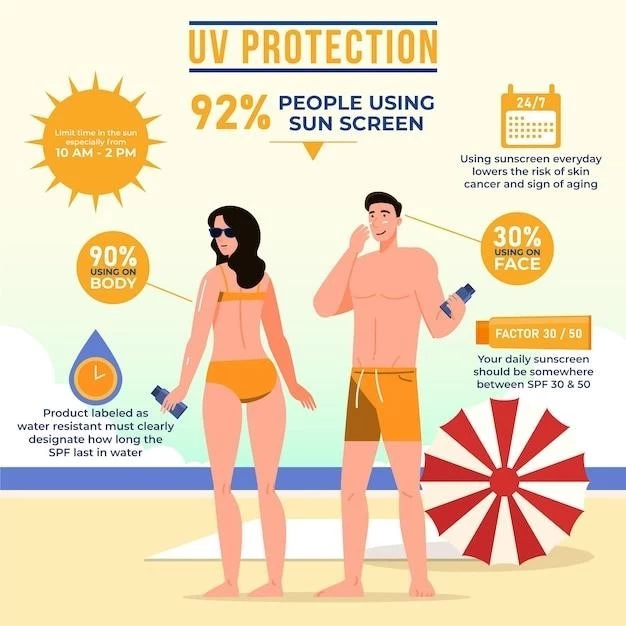Sunscreen⁚ Side Effects and Warnings
Protect your skin by being aware of potential side effects of sunscreen. Always read labels and follow instructions to minimize any risks.
It’s crucial to be aware of potential risks associated with sunscreen‚ such as skin irritation‚ allergic reactions‚ and sensitivity to certain ingredients. Some chemical sunscreens may contain oxybenzone or avobenzone‚ which could cause skin irritation in some individuals. Additionally‚ some people may experience skin reactions like rashes or itching due to fragrance or preservatives present in sunscreen. To minimize risks‚ always perform a patch test before applying a new sunscreen product and consult a dermatologist if you have any concerns.
Importance of Reading Labels and Instructions
Reading sunscreen labels and instructions is essential to ensure proper usage and effectiveness. Pay attention to the SPF level‚ whether it’s broad spectrum‚ and if it’s water-resistant. Follow application guidelines‚ reapply as directed‚ and check for any warnings regarding allergies or skin sensitivities. Understanding how to correctly use sunscreen can help protect your skin from sun damage and minimize potential side effects. When in doubt‚ seek advice from a healthcare professional or pharmacist.
Benefits of Using Protective Sunscreen Lotion
Protect your skin from harmful UV rays while moisturizing and nourishing it with the benefits of using protective sunscreen lotion.
Shielding the Skin from Harmful UV Rays
Using sunscreen shields your skin from harmful UV rays that can cause sunburn‚ premature aging‚ and skin cancer. Make applying sunscreen with sufficient SPF a daily habit to protect your skin from these harmful effects. Remember to reapply sunscreen every two hours if exposed to the sun for extended periods to maintain skin protection.
Moisturizing and Nourishing Properties
Protective sunscreen lotions offer more than just sun protection; they also provide moisturizing and nourishing properties. Look for sunscreen formulations that contain ingredients like hyaluronic acid‚ vitamins E or C‚ and aloe vera to keep your skin hydrated and healthy while shielding it from the sun’s harmful rays. Ensure your daily skincare routine includes applying a protective sunscreen lotion to maintain skin nourishment and protection.
Sunscreen for Skin Cancer Prevention
Using sunscreen daily is essential in preventing skin cancer by protecting against harmful UV radiation that can damage and mutate skin cells.
The Link Between UV Exposure and Skin Cancer
Understanding the link between UV exposure and skin cancer is crucial. UV radiation damages skin cells‚ increasing the risk of skin cancer. Consistent use of sunscreen can help protect your skin from these harmful effects and reduce the risk of developing skin cancer. In addition to sunscreen‚ seek shade‚ wear protective clothing‚ and avoid peak sun hours to further minimize UV exposure and prioritize skin health.
Sunscreen Agent⁚ Common Side Effects
Learn about common side effects of sunscreen like skin irritation‚ allergies‚ and skin sensitivity. Take precautions and consult a professional if needed.
Chemical vs. Physical Sunscreens
When choosing between chemical and physical sunscreens‚ consider your skin type and sensitivity. Chemical sunscreens absorb UV rays‚ while physical sunscreens act as a barrier. Individuals with sensitive skin may prefer physical sunscreens‚ which contain titanium dioxide or zinc oxide. Always perform a patch test and consult a dermatologist to determine which sunscreen type is best suited for your skin to ensure optimal protection with minimal side effects.

The Role of Sunscreens in Preventing Skin Damage
Protect your skin from sun damage by using sunscreen daily to shield against harmful UV radiation and minimize the risk of premature aging and skin cancer.
Protection Against Photodamage
Using sunscreen provides crucial protection against photodamage caused by UV rays. Photodamage can accelerate skin aging‚ leading to wrinkles‚ dark spots‚ and sagging skin. Regularly applying sunscreen with a high SPF can help prevent photodamage‚ maintaining your skin’s health and youthful appearance. Remember to reapply sunscreen every few hours‚ especially when outdoors‚ to shield your skin and reduce the risk of long-term damage.
Understanding Different Types of Sunscreen Products
Explore various sunscreen types like chemical and physical to find one best suited for your skin type. Read labels carefully for optimal sun protection.
Comparing SPF‚ Broad Spectrum‚ and Water Resistance
Understand the significance of SPF‚ broad-spectrum protection‚ and water resistance when choosing sunscreen. SPF indicates UVB protection‚ broad spectrum shields against UVA and UVB rays‚ while water resistance ensures effectiveness while swimming or sweating. Opt for a sunscreen with at least SPF 30‚ broad-spectrum coverage‚ and water resistance for extended outdoor activities to safeguard your skin against sun damage.
